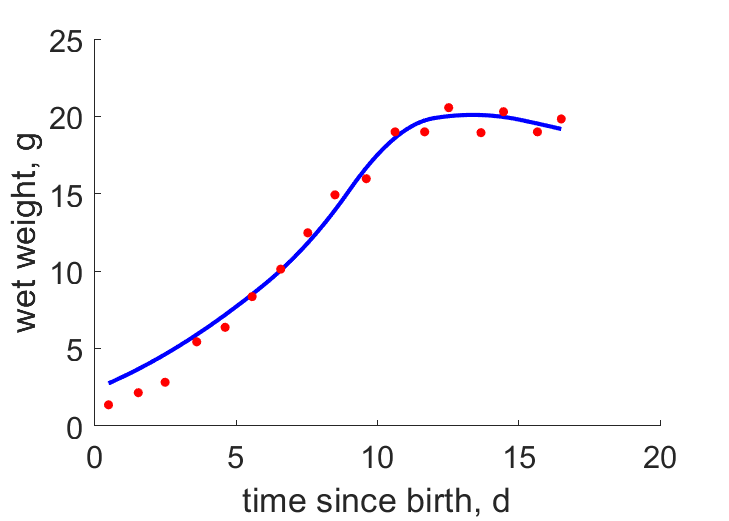Predictions & Data for this entry
| Model: std | climate: BWh, BSh, Cfc | migrate: | phylum: |
| COMPLETE = 2.5 | ecozone: TA, TAt | food: biCi | class: |
| MRE = 0.049 | habitat: 0iTf, 0iTh | gender: Dg | order: |
| SMSE = 0.004 | embryo: Tnpo | reprod: O | family: |
Zero-variate data
| Data | Observed | Predicted | (RE) | Unit | Description | Reference |
|---|---|---|---|---|---|---|
| ab | 12 | 11.37 | (0.05223) | d | age at birth | BrooBroo1989 |
| tx | 17 | 16.95 | (0.002668) | d | time since birth at fledging | BrooBroo1989 |
| tp | 51 | 58.54 | (0.1479) | d | time since birth at puberty | guess |
| tR | 365 | 365 | ( 0) | d | time since birth at 1st brood | guess |
| am | 5475 | 5476 | (9.762e-05) | d | life span | guess |
| Wwb | 1.3 | 1.396 | (0.07357) | g | wet weight at birth | BrooBroo1989 |
| Wwi | 20 | 19.03 | (0.04866) | g | ultimate wet weight | BrooBroo1989 |
| Ri | 0.02466 | 0.02576 | (0.04451) | #/d | maximum reprod rate | guess |
Uni- and bivariate data
| Data | Figure | Independent variable | Dependent variable | (RE) | Reference |
|---|---|---|---|---|---|
| tW |  | time since birth | wet weight | (0.05961) | BrooBroo1989 |
Pseudo-data at Tref = 20°C
| Data | Generalised animal | Chalcites basalis | Unit | Description |
|---|---|---|---|---|
| v | 0.02 | 0.03699 | cm/d | energy conductance |
| p_M | 18 | 686.6 | J/d.cm^3 | vol-spec som maint |
| k_J | 0.002 | 0.02777 | 1/d | maturity maint rate coefficient |
| k | 0.3 | 0.2965 | - | maintenance ratio |
| kap | 0.8 | 0.8161 | - | allocation fraction to soma |
| kap_G | 0.8 | 0.799 | - | growth efficiency |
| kap_R | 0.95 | 0.95 | - | reproduction efficiency |
Discussion
- Body temperature is guessed and lower just after hatching
- mod_1: v is reduced, food availability in tW data taken variable
- mod_1: Pseudo-data point k is used, rather than k_J; Data set tp and parameter t_R are added, the latter replacing clutch interval t_N. Postnatal T is based on PrinPres1991, see get_T_Aves. See further the revision page, theme puberty
Facts
- Brood parasite for Splendid Fairy-wrens Malurus splendens, Yellow-rumped Thornbills Acanthiza chrysorrhoa (major hosts), Western Thornbills A. inornata and Scarlet Robins Petroica multicolor (Ref: BrooBroo1989)
Bibliography